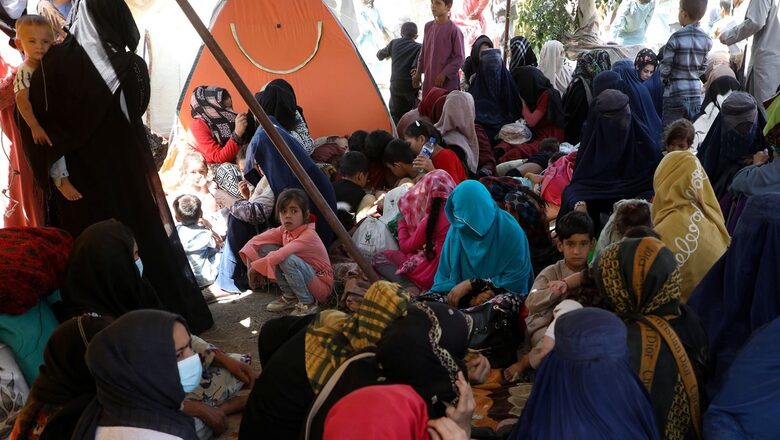
views
The Taliban are very close to gaining complete control of Afghanistan as President Ashraf Ghani steps down leaving the country in fear and dread of return of a regime, horrors of which remain etched in the memories of many. The fall of Kabul will see the hardline Islamic group take back power two decades after US-led forces toppled it in the wake of the September 11, 2001 attacks. Follow LIVE Updates
On the brink of victory, Taliban spokesman Zabihullah Mujahid has assured Kabul’s residents that the power transition would be “peaceful” as he said that all fighters had been instructed to be on standby at all entrances to Kabul until a peaceful and satisfactory transfer of power was agreed.
During their years in power from 1996 to 2001, the Islamist Taliban ran one of the world’s most repressive governments. There were public executions, stonings, strict interpretations of sharia, or Islamic religious law, women not being allowed to work, and girls not allowed to attend school. Women had to cover their face and be accompanied by a male relative if they wanted to venture out of their homes. Men were not allowed to trim their beards. Now, the group is seeking to present a more moderate face.
“In areas which are under the control of the Islamic Emirate, people should lead a normal life, especially in the official arena, whether it is educational, healthy, social or cultural,” the Taliban has said in a statement.
The Islamic Emirate, as the Taliban calls itself, “will, as always, protect their life, property and honour, and create a peaceful and secure environment for its beloved nation,” it said.
ALSO READ | With 126 Passengers On Board, Last Air India Flight Takes Off from Afghanistan’s Kabul: Sources
Women Under Taliban:
As the Taliban capture large parts of Afghanistan, reports emerge of the Islamist group re-imposing their repressive laws. The Taliban have reportedly demanded that families marry off girls aged 15 and above and widows below 40 years of age to their fighters, a charge the Islamist group has denied. The reports have been confirmed by the Ministry of Refugees and Repatriations.
In another incident, girls in the northern Takhar province were lashed for wearing revealing sandals. A schoolteacher from the province said no one was allowed to go out to the market without a male escort. In early July, Taliban insurgents ordered nine workers at Azizi Bank in the southern city of Kandahar to quit work and escorted them to their homes.
Amid such reports, the Taliban have said they respect women’s rights. Women will be allowed to leave homes alone and they will have access to education and work, but they will have to wear the hijab, a Taliban spokesperson told Reuters. Amid fears of stoning and flogging, the Taliban said that policy on punishments will depend on courts. Media will be allowed to criticise anyone, but they should not indulge in character assassination, the spokesperson said.
On the question of allowing women to work in banks, Taliban spokesperson Zabihullah Mujahid has previously said, “After the establishment of the Islamic system, it will be decided according to the law, and God willing, there will be no problems.”
The Taliban, in recent years, have said they are committed to providing women their rights and allowing them to work and attend school, provided they do not flout Islamic or Afghan values. However, the Taliban also said they want to limit the freedom gained in recent years by women, which has promoted “immorality” and “indecency”.
Foreigners Will Be Safe, Say Taliban:
In a statement late on Saturday, the Taliban said its rapid gains showed it was popularly accepted by the Afghan people and reassured both Afghans and foreigners that they would be safe.
Foreigners in the city can leave if they wish, the Taliban said. But if they continue to stay, then they will have to register their presence with Taliban administrators, the spokesperson said.
“We also assure all the diplomats, embassies, consulates, and charitable workers, whether they are international or national that not only no problems will be created for them by the Islamic Emirate of Afghanistan security and a secure environment will be provided to them.”
Taliban Assures Safety to the Moneyed:
The group was “assuring all the banks, businesses, money exchange shops that they will be safe and protected under the Taliban and nobody would touch or bother anyone in Kabul,” CNN quoted Taliban spokesman Zabihullah Mujahid.
“All the wealthy people, the businessmen, they should be safe and protected. None of the Taliban are allowed to go to any houses or conduct searches on businesses and the Islamic Emirate gives them full protection and they should be safe and not worry.”
“The Islamic Emirate of Afghanistan is not interested in anyone’s private property, (not in anyone’s cars, not in anyone’s land and houses, not in anyone’s markets and shops), rather it considers protection of lives and properties of the nation its primary responsibility,” the group has said.
What Happens to Those Who Worked With Foreign Forces?
In a statement issued in June, the Taliban said it would not harm those who worked alongside foreign forces. But this summer, one former interpreter for the US Army was reportedly beheaded by the Taliban.
“All those who have previously worked and helped the invaders (Western troops), or are now standing in the ranks of the corrupt Administration of Kabul, the Islamic Emirate has opened its door for them and have announced for them amnesty,” the Taliban has said in a statement.
Ghani Urges Taliban to Maintain Security:
Afghan President Ashraf Ghani urged government forces Sunday to maintain security in Kabul, after the Taliban paused their sweeping advance on the outskirts of the capital, causing widespread panic.
“It is our responsibility and we will do it in the best possible manner. Anyone who thinks about chaos, plunder or looting will be tackled with force,” he said in a video released to media.
A Taliban spokesman in Qatar later said the group wanted to take control imminently, as he ought to reassure foreigners about the type of government the militants would lead.
Panic Among Citizens:
As the Taliban closed in on the capital, panicked residents swarmed banks for a second straight day, hoping to withdraw their savings. Many were already resigned to the Taliban taking power. “My only wish is that their return leads to peace. That is all we want,” said Kabul shopkeeper Tariq Nezami.
There were also signs people were already resigned to changing their lives to accommodate the resurgent regime. A worker was seen Sunday whitewashing advertising billboards on a beauty parlour featuring a glamorous bride.
For the tens of thousands who have sought refuge in Kabul in recent weeks, the overwhelming mood was one of apprehension and fear.
Horrors of the Previous Taliban Regime:
The Taliban previously governed the country between 1996 and 2001, imposing a strict interpretation of Islamic sharia law before being ousted and launching an insurgency.
Originated in the early 1990s, under the leadership of one-eyed warrior-cleric Mullah Omar, the Taliban promised to restore order and justice amid chaos and corruption of civil war under the Soviet occupation.
Drawing substantial support from Pakistan and initial tacit approval of the United States, the Taliban captured the Kabul on September 27, 1996. While President Burhanuddin Rabbani had already fled, Taliban fighters dragged former communist president Mohammed Najibullah from a United Nations office where he had been sheltering, and hanged him in a public street after torturing him.
The Taliban government imposed the strictest interpretations of Sharia, establishing religious police for the suppression of “vice”.
Music, television and popular pastimes such as kite-flying were banned. Girls’ schools were closed, while women were prevented from working and forced to wear an all-covering burqa in public.
Taliban courts handed out extreme punishments including chopping off the hands of thieves and stoning to death women accused of adultery.
By 1998, they had control of 80 percent of the country, but were only recognised as the legal government by Pakistan, the United Arab Emirates, and Saudi Arabia. The Taliban allowed Afghanistan to become a sanctuary for Al-Qaeda, which set up training camps.
The September 11, 2001 attacks that killed around 3,000 people in the US were immediately blamed on Al-Qaeda. Accusing the Taliban of refusing to hand over Bin Laden, the US and allies launched air strikes on Afghanistan in October.
(With Inputs from AFP, Reuters)
Read all the Latest News, Breaking News and Assembly Elections Live Updates here.



















Comments
0 comment